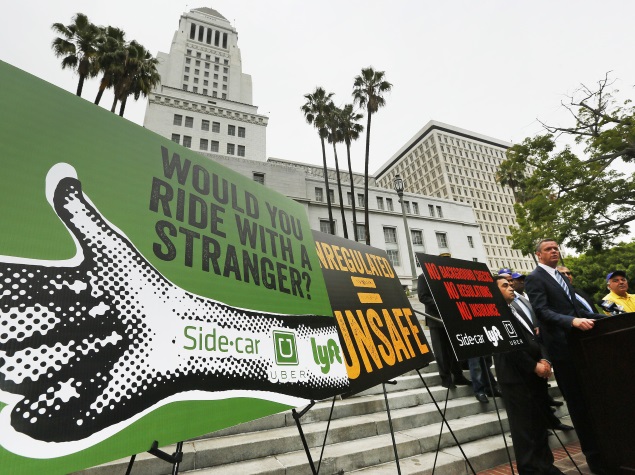Uber Ramps Up Passenger Safety Amid Global Scrutiny

The incident earlier this month in the Indian capital was one of a string of setbacks for the popular but controversial San Francisco-based start-up valued at $40 billion (roughly Rs. 2,52,946 crores) which lets customers hail and pay for taxis or private vehicles via a smartphone app.
"We believe deeply that, alongside our driver partners, we have built the safest transportation option in 260 cities around the world," Uber head of global safety Philip Cardenas said Wednesday in a blog post.
"But we have more work to do, and we will do it."
Uber, which says it tracks every journey by GPS, is developing a safety "roadmap" that includes voice recognition to verify drivers' identities and providing ways for riders to instantly contact the company or loved ones in emergencies.
Uber goes by local regulations when doing background checks of drivers, but is working on making the system better in places where the checks are tricky or untenable.
"This is of deep concern to us," said Cardenas.
"We are finding solutions in many places that range from polygraph exams that fill gaps in available data to adding our own processes on top of existing screening for commercial licenses which is what we are undertaking in India."
'Multi-layered checks'
Uber's website describes a "rigorous" background check process developed in the United States and applied to all of its ridesharing partners.
The process was said to include checks of motor vehicle department and criminal justice records, where available.
"Across the US and in dozens of countries around the world Uber conducts thorough, multi-layered background checks that have resulted in tens of thousands of potential drivers being denied the opportunity to partner on the Uber platform," Cardenas said.
Every Uber ride is traced by location-tracking satellites, and application software displays a designated driver's picture, license plate number and vehicle type to the person waiting to be picked up.
Uber also promised steps to improve customer support, including responses to trouble.
New Delhi last week extended a ban on Uber to all web-based taxi services in the Indian capital.
The city government announced that it was banning Uber with immediate effect after a young female passenger accused the driver of raping her.
Indian police said Uber did not conduct a background check on the driver, who was working for the company while on bail on multiple charges including assault, robbery and rape.
Uber's rapid growth has caused tensions, especially with rival taxi companies which protest that Uber cars are not subject to the same regulations.
Uber has provided 140 million rides for people this year, according to Cardenas.
The company launched in early 2009 and set up its India operation in September of last year.
Along with being targeted by established taxi operators in many cities and ruled illegal in some jurisdictions, the company has seen its image tarnished by executives' gaffes and concerns on privacy.
China move
Chinese search engine Baidu, the country's equivalent of Google, announced Wednesday it has bought a stake in Uber for an undisclosed sum.
Baidu will also link users of its mapping and search functions with Uber drivers, the two companies announced at a ceremony in Beijing. The investment has previously been reported to be as much as $600 million (roughly Rs. 3,794 crores), according to state-run China National Radio.
"Our efforts here in China are unique and will continue to be, let's call it, more unique than anywhere else," Uber CEO Travis Kalanick said at a press conference after the signing ceremony.
"You have to do things differently here in China," he said, without elaborating.
Uber, which connects riders and local drivers, currently operates in nine cities across China, including the capital Beijing and financial hub Shanghai.
But its presence is dwarfed by China's two dominant taxi-hailing apps Kuaidi Dache, in which e-commerce behemoth Alibaba has a stake, and Didi Dache, backed by technology giant Tencent.
Get your daily dose of tech news, reviews, and insights, in under 80 characters on Gadgets 360 Turbo. Connect with fellow tech lovers on our Forum. Follow us on X, Facebook, WhatsApp, Threads and Google News for instant updates. Catch all the action on our YouTube channel.
Related Stories
- Samsung Galaxy Unpacked 2026
- iPhone 17 Pro Max
- ChatGPT
- iOS 26
- Laptop Under 50000
- Smartwatch Under 10000
- Apple Vision Pro
- Oneplus 12
- OnePlus Nord CE 3 Lite 5G
- iPhone 13
- Xiaomi 14 Pro
- Oppo Find N3
- Tecno Spark Go (2023)
- Realme V30
- Best Phones Under 25000
- Samsung Galaxy S24 Series
- Cryptocurrency
- iQoo 12
- Samsung Galaxy S24 Ultra
- Giottus
- Samsung Galaxy Z Flip 5
- Apple 'Scary Fast'
- Housefull 5
- GoPro Hero 12 Black Review
- Invincible Season 2
- JioGlass
- HD Ready TV
- Latest Mobile Phones
- Compare Phones
- Tecno Pova Curve 2 5G
- Lava Yuva Star 3
- Honor X6d
- OPPO K14x 5G
- Samsung Galaxy F70e 5G
- iQOO 15 Ultra
- OPPO A6v 5G
- OPPO A6i+ 5G
- Asus Vivobook 16 (M1605NAQ)
- Asus Vivobook 15 (2026)
- Brave Ark 2-in-1
- Black Shark Gaming Tablet
- boAt Chrome Iris
- HMD Watch P1
- Haier H5E Series
- Acerpure Nitro Z Series 100-inch QLED TV
- Asus ROG Ally
- Nintendo Switch Lite
- Haier 1.6 Ton 5 Star Inverter Split AC (HSU19G-MZAID5BN-INV)
- Haier 1.6 Ton 5 Star Inverter Split AC (HSU19G-MZAIM5BN-INV)







![[Partner Content] OPPO Reno15 Series: AI Portrait Camera, Popout and First Compact Reno](https://www.gadgets360.com/static/mobile/images/spacer.png)









